BULLET TRAIN EXPLOSION (Japan 2025) ***
Directed by Shinji Higuchi[
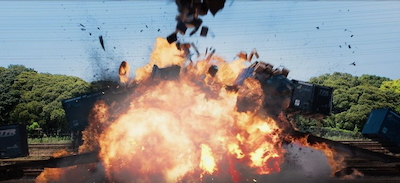
BULLET TRAIN EXPLOSION (Japanese: Shinkansen Daibakuha, lit. 'The Shinkansen's Big Explosion') is a Japanese action thriller film directed by Shinji Higuchi and starring Tsuyoshi Kusanagi, Kanata Hosoda, Non, Takumi Saitoh, Machiko Ono, Jun Kaname and Hana Toyoshima. The film is a remake of the 1975 film The Bullet Train, the film premieres on Netflix on 23 April 2025
THE BULLET TRAIN is famous for inspiring the disaster movie SPEED, with Keanu Reeves driving a bus. When the Hayabusa 60 Shinkansen bound for Tokyo is threatened with a bomb that will instantly detonate if it slows below 100 km/h and the bomber demands a ransom of ¥100 billion for the lives of everyone aboard, the train's crew, as well as government authorities, must race against time to find the bomber and defuse the bomb while keeping the train and its passengers safe.
Director Shinji Higuchi[ shoots his film as efficiently as the bullet speed train operates, all of what may be described as formulaic and directing by numbers - all of which is not that bad a thing that time has proven - the formula works. The pacing is well laid out as expected. It begins with a description of the efficient bullet train and how it transports passengers for various reasons across the country. It is only after 10 minutes that news of a bomb is planted on the train and only after an hour that the bomber is identified. The climax involves saving the passengers. The film lacks an evil villain, and the bomber’s cause is compromised by her reason for doing the deed.
A big plus in this new disaster movie is the integration of high tech with the story. Aboard the train, an influencer is asking followers to donate money to pay the ransom in order to save lives on the train. No other disaster films have integrated social media with disaster movies.
The film, being Japanese also displays Japanese traits. When the bomber’s identity is made known to the passengers, the staff apologize to the passengers, as is customary in Japanese tradition - to be always polite and apologize. But there is always someone on the train who will blame the railway staff for anything. An argument then arises in one of the film’s key scenes when one irate idiot passenger rudely accuses the staff of not doing their work, only to be rebuked by another passenger. These little incidents add to the amusement of the disaster movie.
The addition of modern transit technology is also on full display in the film. Even if one may not be interested in the disaster scenario, there is plenty of tech stuff to gawk at. The Japanese rail control centre shows how efficient everything is, from the display of train times and possible delays right down to the exact times the trains arrive or reach each station. The staff is shown to be sufficiently trained and effective at their jobs, not to mention as dedicated as their North American counterparts.
The film also focuses on a select few characters. These include, among others, a veteran rail employee and a rookie, a well-known, familiar female politician, a young daughter and father, among others, all adding a little personal touch to the story.
The expected climax is a bit of a let-down, partly owing to the excellent build-up.
Trailer:
EGGHEAD & TWINKIE (USA 2022) ***
Directed by Sarah Kambe Holland
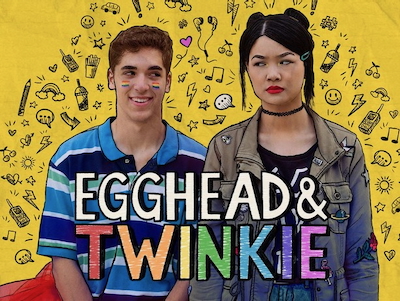
EGGHEAD AND TWINKIE, written and directed by Sarah Kambe Holland
plays as a road trip teenage movie about two teens who don’t know much about themselves, life, what they want, or anything else. The film is a mix of live-action and animation and is breezy and light. It looks and feels like a film with a limited target audience of LGBTQ+ or teens, but despite the fact, EGGHAD AND TWINKIE has its charm and has moved the hearts of many a moviegoer, earning a solid 95% rating on Rotten Tomatoes at the time of writing this review.
EGGHEAD AND TWINKIE begins with voiceover claiming that these two have been friends for life and have never had an argument. Of course, they do as depicted at the start when the two meet at a restaurant to sort out their differences. Twinkie has left Egghead stranded during a road trip. I would never forgive any person who would do that to me, but apparently Egghead does, as he is in love with her. And then she comes out to him that she is gay.
The simple premise of the film involves an Asian American teenage girl, Twinkie (Sabrina Jieafa) who after coming out to her adoptive parents, takes off on a road trip to meet her online crush, BD (Ayden Lee) with the help of her nerdy best friend, Egghead (Louis Tomeo).
The two leads, Jieafa and Tomeo deliver charming, goofy and innocent enough performances for the audience to identify with. The raid trip encounters are eventful enough leading them to try to ditch paying a restaurant bill. But they pay after finding the money showing them to be liable chacrerts with no bad stuff in their hearts.
Besides the funny stuff. The film hits some high emotional notes with its coming-of-age dramatic moments. This is a film that would be difficult to dislike
EGGHEAD AND TWINKIE is available on demand April the 29th in Canada and the US.
Trailer:
FREWAKA (Ireland 2024) ***½
Directed by Aislinn Clarke
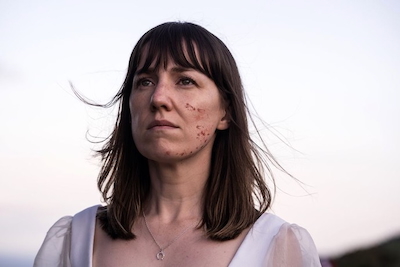
The Irish folk horror film, FREWAKA from Aislinn Clarke (The Devil’s Doorway) follows home care worker Shoo, who is sent to a remote village to care for an agoraphobic woman who fears the neighbours as much as she fears the Na Sídhe — sinister entities who she believes abducted her decades before. As the two develop a strangely deep connection, Shoo is consumed by the old woman’s paranoia, rituals, and superstitions, eventually confronting the horrors from her past.
FREWAKA is an Irish folk horror movie in the best sense of the word. It is set in a quaint Irish village full of typical Irish folk, inquisitive and unwelcoming to strangers. The story is set in an old house filled with Irish charms like a horseshoe and other paraphernalia. The film is also shot in Irish Gaelic with some English, proving the point that the language, though not dead, often deals with the dead.
FREWAKA, the film title (Irish-language, like much of the dialogue) is shortened from the original “Fréamhacha,” and translates as “roots” — a concept that hard-headed protagonist Siobhan (Clare Monnelly), who prefers to be called Shoo, doesn’t much care for. Roots could refer to the past of either of the two protagonists. One is Shoo who is reeling from the death of her mother, who is did not get along with and the other, Peig (Bríd Ní Neachtain), the elderly lady Shoo looks after as a caregiver, her roots for isolation that lay in a disastrous rural wedding, that is shown as the introduction of the film. Peig believes she was abducted decades ago, a fact that is backed up by newspaper cuttings that the bride had gone missing after the wedding. The poster of the film has roots emanating from the eyes of a human.
Director Clarke’s film flows smoothly and coherently. It begins with a wedding. The action then moves to the present day, where, to the tune of an old Irish ballad, a woman takes her own life. Her daughter Shoo (Clare Monnelly), is a care worker whose reasons for estrangement from her mother will have an increasing impact on her mental state. Engaged to her pregnant Ukrainian fiancé Mila (Aleksandra Bystrzhitskaya), Shoo is grateful to cut short clearing her mother’s house to start a live-in job looking after an elderly agoraphobic, Peig, in the remote Irish countryside, leaving Mila to continue the pregnancy alone.
The set decor is admirable, with lots of details involving Irish folk stuff. The wardrobe like the yobs wearing medieval straw masks are also scary as well as impressive, not to mention the wedding ware. Director Clarke is also adept at creating a scary atmosphere and period that is present throughout the film.
The two characters are each interesting enough, both having problems of their own, each searching for isolation but eventually finding a bond owing to their somewhat similar uncomfortable past. An addition to the story involves the estranged relationship between Shoo and her girlfriend, who has to put up with her anger at her deceased mother. She cannot undreamt Shoo’s behaviour.
FREWAKA opens for streaming on Shudder on April 25 in Canada, the U.S. and other countries. Thesis is one of the better horror flicks on Shudder. It's well worth a watch.
Trailer:
HAVOC (USA 2025) ***
Directed by Gareth Evans
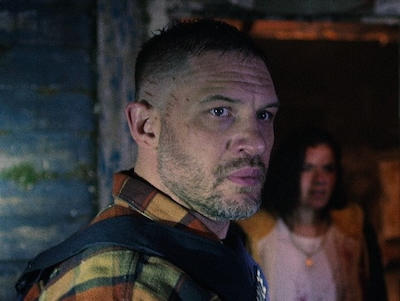
Tom Hardy (MAD MAX, THE BIKERIDERS), arguably the only action hero actor who can act, is the best thing about the new (actually the film has been set on the shelf in limbo since almost the Pandemic) action film HAVOC. Director Evans (THE RAID, THE RAID 2) knows the fact and gets serious drama, as can be observed in the film’s initial elaborate voiceover. The message is on the choices one makes, initially good until ……. Apparently, the film’s protagonist, played by Tom Hardy, a homicide detective, made the wrong choice of being a dirty cop. He has turned good but stands to lose his family, his friends, and then according to the voiceover, himself.
After a drug deal goes awry, a bruised detective must fight his way through a criminal underworld to rescue a politician's estranged son while untangling his city's dark web of conspiracy and corruption.
Director Evans attempts neo-noir, but the mix does not really work that well. The film is no half-hand but it faces stiff competition to action and action thrillers out there like THE ACCOUNTANT2, DROP and SINNERS. At least this one can be watched at home on Netflix. HAVOC opens for streaming on Netflix this week on Friday, April 25th.Trailer:
ON SWIFT HORSES (USA 2024) ***½
Directed by Daniel Minahan
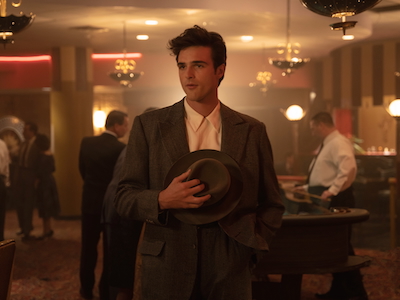
ON SWIFT HORSES is a slow-burn noir, characterized by the fact that there is a lot of smoking done here by the characters, about a newlywed whose life is upended by the arrival of her wayward brother-in-law. The noir drama is set in the 1950s when a man and a woman are expected to marry and settle down, and homosexuality is not only frowned upon but treated with hate, anger and violence. The film is meticulously adapted from Shannon Pufahl’s novel of the same name
The title ON SWIFT HORSES comes from the Bible — specifically, Isaiah 30:16. The verse says:
“You said, ‘No, we will flee on horses.’
Therefore, you will flee!
You said, ‘We will ride off on swift horses.’
Therefore, your pursuers will be swift!”
This quote is essentially about people trying to escape something, relying on speed and distance rather than confronting what’s happening. In the context of Shannon Pufahl’s novel, which the film is based on, and the film adaptation, the title reflects the emotional and psychological state of the characters. They are all, in different ways, running from their pasts, from expectations, from the limitations placed on them by society in the 1950s.
The "swift horses" evoke both literal escape (like driving through the desert, gambling, or just disappearing) and emotional escape (into secrecy, desire, or fantasy). So the title has this poetic resonance about longing, risk, and flight.
Muriel (Daisy Edgar-Jones) and Lee (Will Poulter) are the new married couple planning to move from Kansas to start married life in California. Then Muriel meets Lee’s brother Julius (Jacob Elordi), a charismatic gambler with a secret past. Their connection is instant, like kindred souls. Nevertheless, Muriel and Lee follow the American Dream in San Diego while Julius heads out to Las Vegas. Their paths meet, but the result is far from desirable,
The film might be hard to take in (though not implying that it is a bad film) for a couple of reasons, the slow burn being one of them. The characters are not that likable either, as they do not seem to know what they want, and they hurt each other in the process of trying to escape to a better life. Most of their teams are unattainable, mostly by both fate and their doing, which means that the audiences should be prepared for an unhappy ending.
Performances are top notch all around, especially Elordi, touted to have turned down the role of the new James Bond for the purpose of getting into more diverse roles like this one. Poulter is outstanding too, playing the role of a ‘good man’ as his wife describes his character in one key scene. Also added to the film’s please is the noir period atmosphere taken into the story’s setting. The film was shot by Canada’s Luc Montpellier (Women Talking), whose stunning cinematography captures not only the look of the Eisenhower era (the cookie-cutter houses, the pristine landscapes) but also the fringes of Americana (casinos, race tracks, cruising parks, and gay bars).
ON SWIFT HORSES opens in theatres across Canada, including Toronto April 25th.
Trailer:
PANGOLIN: KULU’S JOURNEY (UK 2025) ***½
Directed by Pippa Ehrlich

What is more adorable than a pangolin? The answer is a baby pangolin, a harmless, so vulnerable and helpless creature, that one part just goes out to preserve this wonderful mammal
A pangolin will roll up a ball of its scales when threatened. These solitary, primarily nocturnal animals are easily recognized by their full armour of scales. A startled pangolin will cover its head with its front legs, exposing its scales to any potential predator. If touched or grabbed, it will roll up completely into a ball, while the sharp scales on the tail can be used to lash out. Also called scaly anteaters because of their preferred diet, pangolins are the most trafficked mammal in the world, with demand primarily in Asia and in growing amounts in Africa, for their meat and scales. There is also demand in the United States for pangolin products, particularly for their leather to be used in boots, bags, and belts.
Eight species of pangolins are found on two continents. They range from Vulnerable to Critically Endangered.
This wonderful educational Netflix documentary, directed by Pippa Ehrlich, who directed the Academy Award-winning documentary THE OCTOPUS TEACHER, follows a baby pangolin, rescued from poachers as seen at the start of the film. Apparently director Ehrlich was coerced into making the film after being sent footage of the pangolin. The male baby pangolin Kulu is handled by Gareth, whose purpose is to guide the pangolin back to the wild and survival. The story is quite basic. Unlike most docs, this one does not follow the life of he subject from birth to adulthood. Instead, it follows a pangolin’s rehabilitation to the point when he is able to survive on his own in the wild. Kulu was almost sold and slaughtered by poachers when a sting operation rescued him. His handler looks after him till he reaches 6.5 kg, when it is a safe enough weight for him to survive on his own. But an incident involving an electric fence that almost killed Kuu left him traumatized and mistrusting of Gareth. It took a while before trust was once again attained. What is marvellous is to observe the bond between a human and a wild animal, not to mention that this pangolin is 100% cute. The best scene involves watching the pangolin feasting on termites.
The film’s setting is Joburg. Joburg is short for Johannesburg, South Africa's biggest city and capital of Gauteng province, which began as a 19th-century gold-mining settlement. Its sprawling Soweto township was once home to Nelson Mandela and Desmond Tutu. Mandela’s former residence is now the Mandela House museum. Other Soweto museums that recount the struggle to end segregation include the somber Apartheid Museum and Constitution Hill, a former prison complex.
The film’s best moments are its simplest, just watching the pangolin move on its hind legs and propelling itself with the aide of its two arms. Watching it feed on ants and their eggs is also quiet the sight. In defence, the ants bite the pangolin’s tongue, which must hurt it as well.
PANGOLIN: KULU’S JOURNEY is currently streaming on Netflix.
Trailer:
THE TROUBLE WITH JESSICA (UK 2023) ***
Directed by Matt Witt
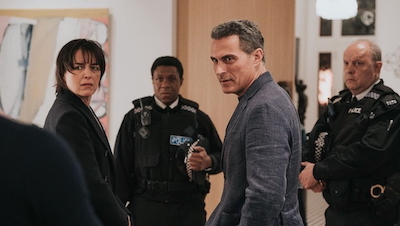
Everyone loves a good London play at west end. The new British film set in North London plays like a chamber piece except for one segment in which body is moved across North London in a car. Though one might complain about the film being stagey, staginess can still be entertaining. After all, people do go and see plays.
The film’s title is likely derived from the classic Alfred Hitchcock 1955 movie THE TROUBLE WITH HARRY, also about having to dispose of a dead body - in that movie, the body is Harry, and this movie, THE TROUBLE WITH JESSICA, is unveiled in chapters entitled:
The Trouble with Friends
The Trouble with Neighbours
The Trouble with the police
The Trouble with Friends
among others…….
Chamber pieces work best as whodunnits, bedroom farce, and comedy. THE TROUBLE WITH JESSICA can be described as a comedy of errors.
The actors playing the Londoners are English, Scots Welsh and American, no attempts made to hide their basic accents. No complaints here, as the script can always offer an excuse for the different accents.
The premise is simple enough: Four friends, two married couples and Jessica are having a dinner party. The host is making clafoutis, which is a running joke throughout the movie. Jessica is clearly the shit disturber. She excuses herself during the dinner and hangs herself. The j=hostess denies to,ove the body as she is about to sell the house and a suicide world brings down the price of the listing. So, the four have to decide what is the best thing to do, and finally decide to move Jessica’s body to her pace, noticed. But neighbours, plociw and guilt come in the way,
The characters can hardly be described as likable. The most dislikable is clearly Jessica, who shows up at dinner creating havoc and flirting with all the husbands. Jessica has done what she has wanted all her life, which is having sex, getting drunk, and snorting coke, and has just written a best-seller of her life. Then, she hangs herself at her friend’s dinner party. Her character is obviously written for audiences to hate, and when she is out of the picture after her suicide, the audience can only be too pleased. The funny part is that Jessica is even more toxic dead than alive. The actress playing Jessica is half Indian and Swiss, exhibiting the beauty of cross-race marriages.
The script carefully places personalities against each character, while making each one distinct and different. The clearly most disliked one, actually, none of the characters are actually angels, is the self-proclaimed do-gooder played by Olivia Williams. She is always morally correct and is never too shy to discuss it. She is the first to oppose disposing of Jessica’s body. Her husband cannot stand her because of the fact that he loves her.
THE TROUBLE WITH JESSICA premiered at the ICFF (Italian International Film Festival) last year and opens in theatres April 25th. Undemanding and entertaining British fare that is a pleasure to watch!
Trailer:
UNTIL DAWN (USA 2025) ***
Directed by David F. Sandberg
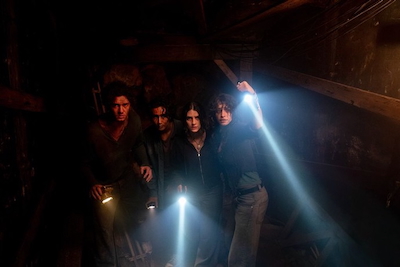
Horror time loop movies are themselves a genre of their own, films like HAPPY DEATH DAY, THE ENDLESS and TIME LAPSE being the most remembered ones. The best of the lot happens to be from Sweden and Denmark, called KOKO-DI, KOKO-DA, which should definitely be checked out if this is your favourite horror genre. A new one opens this week in theatres, entitled UNTIL DAWN, which is based on a video game. The premise is that the characters must stay alive UNTIL DAWN or they will relive their deaths again and again and again. How do they know this? In one of the sessions, a witch (Mariann Hermányi) tells one of the characters the important message. Yes, this all makes little sense, but what can one expect from a film based on a video game
UNTIL DAWN is not that scary a film, KOKO-DI, KOKO-DA, in contrast, is incredibly scary and also funny in that the campers who are repeatedly slaughtered violently do nothing to try to escape their repeated demise. In UNTIL DAWN, they try to survive till dawn. After all, what else can be expected of them to do? The climax and a short clip of what happens next, maybe prompting a sequel, are nothing out of the expected and rather clichéd.
At the start of the film, the audience sees a group of friends travelling by car to find out the mystery of the disappearance of Clover’s (Ella Rubin) sister, Melanie (Maia Mitchell). The group is comprised of Clover’s ex, Max (Michale Cimino), friends Nina (Odessa A’zion), Megan (Ji-Young Woo) and Abe (Belmont Call). The script by Blair Butler and Gary Dauberman makes no great attempt at distinguishing each character, though one can tell the other apart for example, that Megan is Asian and can sense ‘spirits’ while Max and Abe look quite different. But the cast of relative unknowns delivers solid performances.
The script also does not contain any remarkable twists in the plot nor does director Sandberg (also Swedish like the director of KOKO-DI, KOKO-DA), and director of scary films like ANNABELLE: CREATION and LIGHTS OUT create any originally fresh horror set pieces. Director Sandberg relies on one too many jump scares, which make many of the audience around me at the promo screening jump out of their seats. The horror special effects work well, especially the exploding bodies in one sequence of the film. The horror story also lacks an evil villain, though Dr. Hill (Peter Stormare) manages a few scares. The creation of the ‘waterwall’ is the film’s most impressive and eerie premise, as well as the characters trying to escape while driving in fog. Driving in fog, and unable to see clearly through the windshield is one of the common nightmares people have.
UNTIL DAWN should satisfy horror fans with scares, violence and gory scenes, though it can be said that the film is not genuinely hauntingly frightening or eerie. UNTIL DAWN will be up for stiff competition with the other blockbuster and well-reviewed SINNERS that opened last week.
Trailer:





Comments powered by CComment